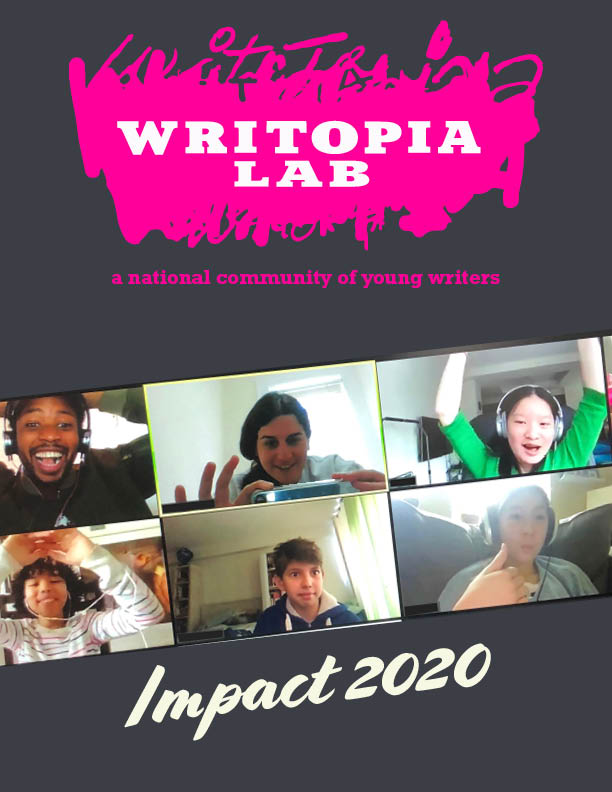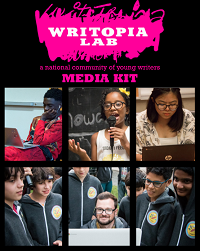October 26, 2014

The Write Stuff
by Katie Linek
The Power of Expression in a Safe Space
In a small New York City theater one May evening, the lights go down and a series of short, entertaining, and thought-provoking plays begins. Touching on themes like cultural tension, mental illness, and dysfunctional relationships, each play brings something unique to the table. What’s more, each play was written by an up-and-coming playwright under the age of 18.
The writers are all students of Writopia Lab, a nonprofit that holds writing workshops in schools, treatment facilities, homeless shelters, and public libraries. The organization, which operates in several cities, works with children and teens from all walks of life, aiming to foster joy, literacy, and critical thinking through creative writing.
Writopia students write anything from fiction and memoirs to graphic novels and poetry. The annual Worldwide Plays Festival highlights the work of the program’s young playwrights.
A Playwright Is Born
Writopia Lab produces the weeklong festival each May, presenting the plays Off-Broadway, in a professional New York City theater that is smaller than those traditionally used for Broadway shows. The event celebrates voices and themes that span socioeconomic groups and geographical regions, delivering humor and fresh perspectives. Each play is developed and polished by a young writer at one of Writopia’s workshops; professional directors and actors are then matched to each play, rehearsing the work and bringing it to life.
“The writing of our Writopia students continues to bring remarkable creativity, risk, truth, and beauty to the stage, while the professionalism and skill of the directors, designers, actors, and crew create a spectacular platform that showcases the power of these works,” says Kara Ayn Napolitano, managing artistic director of Writopia Lab.
Worldwide Pants, Inc., owned by television host and comedian David Letterman, has sponsored the festival for four years, enabling Writopia Lab to present the work of more than 250 playwrights. Forty-eight plays and musicals were produced this year alone.
Markus, an eighth-grader whose play was produced in May, drew on real-life experiences to develop his story. Raised in the Bronx and attending the free Writopia workshops offered by the New York Public Library (NYPL), he wanted to reflect New York City’s diversity while incorporating his love of classical music. The result was Premiere, a play depicting cultural tensions between two students—one Jewish, the other German—who are brought together by classical music.
“I really enjoy the program,” explains Markus. “I learned how to be a better writer and to elaborate more. I definitely want to continue writing.”
“Writopia was a wonderful experience for the children at the New York Public Library—offering them a creative outlet in a unique and innovative way,” says the NYPL’s director for library sites and services, Kevin Winkler. “The library strives to offer a variety of programs that can inspire as well as educate, and Writopia allowed us to do just that.”
Another Writopia student, Sharm, explains that Writopia helped him get his emotions out, “because you can be creative and open there.” Sharm joined the program while living at a treatment facility for incarcerated youth. His play, Housing, mixes equal parts humor and reality in exploring a young man’s relationships with his sister and his girlfriend as they argue over living arrangements.
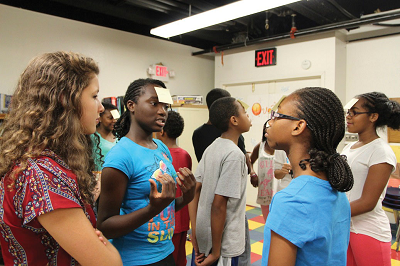
Expressing Emotion through Writing
Students find themselves at Writopia Lab for an assortment of reasons; some are already accomplished writers in search of high-quality feedback, while others are struggling with writing in school and need a safe place to develop their skills. Still others turn to Writopia as an alternative form of therapy.
One young writer, Ronnie, lives in a treatment facility that provides long-term care to teenagers with behavioral problems, emotional difficulties, and mental illness. Most of the teens residing there have been through the juvenile justice system, including Ronnie.
Upon joining a Writopia Lab workshop, Ronnie found a comfortable and productive way to explore and express his anger and depression—through his writing.
“I love writing poems,” explains Ronnie. “If I had a rough week, I can come down to workshop and sum it all up in a poem. It helps a lot.”
The program coordinators describe him as passionate, prolific, and engaged. Ronnie says that the workshop is the highlight of his week and plans to continue participating in Writopia after he leaves the residential treatment facility.
“The activities we have in the residential treatment facilities are used for nontraditional therapy,” says Fastima Gooden, activity coordinator at one of the facilities where Writopia offers workshops. “These defiant kids come to Writopia and are given the opportunity to openly express themselves. It really boosts their self-esteem.”
In May, Voices, a play written by Ronnie about a young man’s struggle with mental illness, was produced.
Creative Writing for All
In 2006 Writopia’s founder, Rebecca Wallace-Segall, was hired by the principal of a school on Manhattan’s Upper West Side to run a creative writing program.
“I loved what I was doing there, and the kids were getting a wonderful experience. They were winning more writing awards than those from the top private and public schools,” explains Wallace-Segall.
In 2007, when it was announced that, despite its success, the writing program was going to be cut, Wallace-Segall and ten parents decided to found Writopia, taking the creative writing program to the public sector.
“My original work at the school was with kids who came from privilege, and when we started Writopia, we wanted our workshops to be available to a broad range of kids,” Wallace-Segall says. “We are the most socio-economically diverse writing program in New York City. We’re not a segregated program; we dig deep into diverse characters and people, and by exposing them to each other, their lives and writing become richer.”
Although founded in New York City, Writopia has spread to areas across the country, including Westchester County, New York; Los Angeles; Washington, D.C.; and Chicago. The program now serves more than 2,000 kids per year and continues to grow.
Enrichment for a Vulnerable Population
One hot Tuesday in August, around 15 kids are seated in a classroom at Saratoga Family Inn, a homeless shelter run by Homes for the Homeless, a New York City–based shelter provider. Hanging on the wall are signs that read, “Attitude is a little thing that makes a big difference.” The room is buzzing with energy and excitement as the children talk.
This is the last week of a six-week workshop run by Writopia as part of the Saratoga Summer Day Camp, a full-day program for homeless and at-risk youth. Meeting three times a week, the instructors help two groups of kids—one made up of children under 13 and the other made up of teens—develop short stories from which they will read excerpts for an audience in just two days. In September, they will each receive a book of all of their stories.
A handful of the younger kids are at the computers off to the side of the room, finishing and editing their stories with the help of instructors who walk around offering guidance and asking thought-provoking questions. Across the room, kids who have already finished take part in games and exercises to keep their creativity flowing.
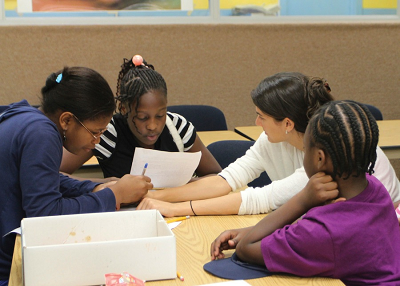
One ten-year-old girl sits at a table surrounded by her peers, answering their questions from the perspective of Chrissie, a character she created. Her answers get her thinking about what to include in her short story to develop her character further.
In another activity, students use the five senses to describe where they are from. One girl who has been quiet up until now brightens up and offers to read her poem, beginning: “In my Africa, we dance.” The instructors’ faces light up, and the other children actively listen. When the poem is over, the other members of the group take turns giving positive feedback. The young girl, who seemed down at the start of the day, now appears engaged and excited to continue working on her poem.
Elsewhere in the room, an eight-year-old boy sits alone, looking upset. One of the instructors walks over and takes a seat next to him, asking if he is all right. When he does not respond, the instructor asks if writing another story would make him feel better. The boy nods his head, gives a little smile, and runs back over to a computer.
Later in the day, the teen group gathers in a circle in a small room. This group is initially withdrawn, but as they go around the circle sharing their favorite and least favorite words, the mood lightens. Some students break away to finish their stories, while others share with the group parts of what they have written. Each time, they are flooded with positive feedback from their peers, which visibly increases their confidence.
The instructor, Jessie, reveals that seeing this change in attitude is her favorite part of the job. “You can see it. These kids come in, some visibly in a bad mood. It’s rewarding to see that by the end they are participating and engaging with the group. They are all so talented.”
Homeless children are more likely to struggle in school and have emotional and behavioral issues than children living in stable housing. Writopia helps these kids express their emotions through writing while improving their skills.
“Writopia instructors work with our kids one on one, giving them personal attention and showing them that writing can be fun,” explains Saratoga Family Inn Administrator Mike Fahy. “Homes for the Homeless knows how important it is for all kids to have the same opportunities to learn and grow. That’s why enriching activities like Writopia, which works with children from all walks of life, are so important and appreciated.”
The Writing Crisis
According to research, students of all ages struggle to write proficiently. Data from the National Center for Educational Statistics and the National Center for Educational Progress found that only one in five students in the U.S. is able to write competently. The English Journal, published by the National Council of Teachers of English, reported that 67 percent of high school freshmen tested below grade level in writing.
Theories about why this may be the case run the gamut. Some believe the issue is that writing instruction is not rigorous enough and focuses too much on expressing feelings, rather than on teaching students how to write logically and precisely. The new Common Core Standards, national guidelines adopted by 45 states and the District of Columbia, address that concern by putting emphasis on persuasive writing.
Others, however, argue that standardized testing and the associated curricula are the problem, leaving kids feeling disconnected from the learning process. Wallace-Segall explains, “Kids don’t feel like thinkers or creators anymore.” In fact, one of the top three reasons students give for their dislike of writing is that the constrictive nature of many assignments makes them feel out of touch with what they are doing, according to the National Assessment of Educational Progress. Students also say they dislike writing because they do not know how to write or are not sure what teachers want.
Many times, students do not want to express themselves for fear of being laughed at by peers or causing concern among adults with their violent, mature, or “out-of-the-box” ideas. For example, a student writing a story about suicide is not necessarily suicidal. Writopia, on the other hand, is a place where unusual ideas are taken seriously and serious ideas do not cause alarm.
In 2012 Rebecca Wallace-Segall spoke at a TEDx event, a local, self-organized program that brings people together to spark deep discussion. TEDx events are hosted by TED, a global nonprofit dedicated to spreading ideas in the form of short, powerful talks. Wallace-Segall’s talk centered on education policy and the importance of empathetic, high-level creative writing instruction. Wallace-Segall explained, “When you start talking about grades, creativity often shuts down. A lot of teens say they don’t feel comfortable being their full selves in the classroom. This may lead to kids feeling disconnected, but sometimes it leads to depression. In the most extreme cases it leads to kids dropping out of school.”
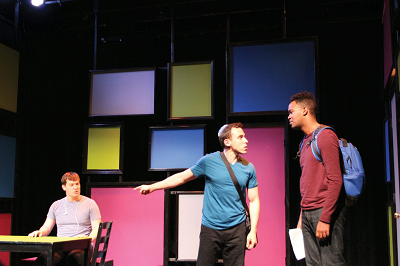
For a key demographic served by Writopia, low-income and homeless students, mitigating the possibility of students’ dropping out of school is extremely important. The Institute for Children, Poverty, and Homelessness (ICPH) found in its report “A Tale of Two Students: Homelessness in New York City Public Schools” that after four years in high school, only 50 percent of homeless New York City students graduate on time, compared with 65 percent of all students; 15 percent of homeless students drop out.
ICPH explained in another report, “An Unstable Foundation: Factors that Impact Educational Attainment among Homeless Children,” that children who experience homelessness at a young age are more likely to demonstrate behavioral problems such as aggression, social withdrawal, depression, and anxiety, which can lead to academic, social, and economic difficulties. Writopia’s therapeutic effect on its students may help to offset some of the behavioral problems that can occur.
In addition, studies show that strong writing skills are essential in the professional arena, no matter the field. Over two-thirds of salaried jobs require a significant amount of written work. It is no surprise, then, that workers with good writing skills stand a much higher chance of advancing in their careers.
The Partnership for 21st Century Skills, surveying employers about the writing of recent graduates hired, found that 26 percent had substandard writing abilities and that 28 percent of those were so deficient in written-communication skills that they struggled with their basic duties. The National Commission on Writing estimated that top American companies spend over $3 billion a year, and state governments around $221 million per year, to foster employees’ writing skills.
The Key Is a Safe Space
The key to the program’s success is that the writing process takes place in an uncensored environment with the guidance of published authors and produced playwrights. At Writopia students find a creative and intellectual atmosphere that might not otherwise be available to them. For young people who struggle with verbal and written expression, the program offers a safe space to develop these skills. The students become comfortable with expressing themselves on paper, and many eventually acquire a love of writing.
“Writopia has grown so quickly because kids and teens need a safe place to be themselves ... to think, process, write, and share their ideas, experiences, and fantasies,” says Wallace-Segall. “Writopia has grown because our instructors are the warmest, most brilliant people in their cities—and because they are deeply invested in the well-being of youth. We have complex, dynamic conversations with them about each and every sentence, story development, and resolution in their stories rather than assess what is ‘right’ or ‘wrong.’ This is something incredibly exciting for most kids and teens who are used to being ‘taught’ and ‘graded.’”
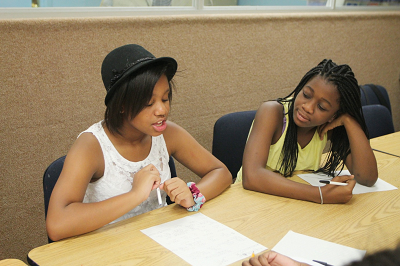
Writopia uses a student-centered approach to teach writing, allowing lessons to occur naturally in the course of the work. “Their work is generated from what the kids want to do and write, which leads to an authentic writing experience,” says Wallace-Segall. “These kids talk about and process the world together. They develop their pieces with, and in support of, one another. In the end, the pieces that emerge are extraordinary.” Students use tools and games to help start and share stories. Instructors then challenge students to set and achieve writing goals, encouraging them to complete at least one well-developed, polished piece over the course of the workshop.
“I love the moment when a writer is surprised by the power of his or her own work—when they discover they expressed something new and bold,” explains the associate director of camps and curriculum instructor for Writopia, Danielle Sheeler. “I love when a writer realizes that they have met their own goals and feel proud of their accomplishments.”
Writing is not the only skill improved at these workshops, however. Students learn effective verbal communication, editing, analysis, and leadership skills while working with their peers. The access they are given to technology gives the writers an opportunity to acquire computer skills necessary in today’s technologically driven workforce.
Writopia also does not turn anyone away for financial reasons. Fourteen percent of its program funding comes from donations or grants, such as David Letterman’s production company, Worldwide Pants. The other 86 percent of Writopia’s funding comes from its sliding-scale fees. Wallace-Segall explains, “There is a no-questions-asked, no-application, pay-what-you-can policy.”
"We Help Kids Find Their Voices”
Success stories flow out of Writopia Lab, with results both academic and emotional.
The Worldwide Plays Festival is just one of several programs offered by Writopia Lab. After-school and weekend workshops, a summer sleepaway camp, and help with college application essays are also offered. Some students have performed their poetry at the Nuyorican Poets Café, a famous New York City venue for poetry, hip-hop and other music, video, visual arts, comedy, and theater, which has a long tradition of providing performance opportunities for both rising and established artists.
Program participants have won numerous regional and national Scholastic Writing Awards, the nation’s most prestigious and longest-running writing competition for teens. Two Writopia participants won the National Gold Medal Portfolio Award, the highest Scholastic Art & Writing Awards honor, which includes a $10,000 scholarship.
What’s more, reluctant kids and teens are now considering themselves writers, many of those who hated writing now love it, and kids who already loved to write are now doing so at a higher level and more openly than ever before.
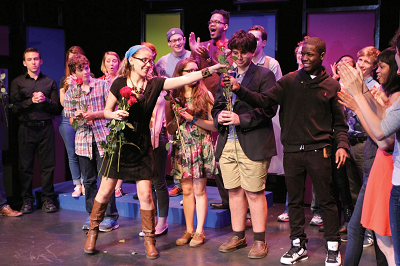
Wallace-Segall tells the story of a young man who came to the program just last week. “A mother told me that her son, a teen who had previously declared that he had no interest in college, stated that he wanted to ‘become a writer and go to Yale.’ I loved that. He spent one week here and he felt better about himself as a thinker and an artist—and he felt a part of the world in such a positive way.”
“They become more confident about expressing their feelings, thoughts, and experiences on the page. They feel that their stories are important and worth writing down and sharing,” says Sheeler.
Wallace-Segall continues, “We help kids find their voices and intellectualism. We ask them to think about why characters do what they do. They think on deep, beautiful, philosophical levels. Parents tell us that we have reawakened their children’s spirit.”
Parents report seeing an increased confidence in writing, improved grades and standardized test scores, strengthened relationships with teachers and friends, and more informed and lucidly expressed views of the world.
The instructors also find the program rewarding, for the students as well as themselves. Strong connections form between the instructors and students. Sheeler explains, “The teens often write memoirs and autobiographical poetry. They open up and share many personal life experiences. We establish a strong sense of trust.”
Rebecca Wallace-Segall loves helping teens “calm down, open up, laugh, and write more and more honest, wonderful work. I cry almost every day here because that process can be so intense.”
To protect the safety and privacy of those we interviewed, we have not included the full names of program participants and treatment centers.
Writopia Lab in the News
- Celebrating a Decade of Partnership: HFH’s Tierra Gunther Honored at Writopia Lab’s 2025 Gala
- AWS in Kimball Union Magazine Fall-Winter 2025
- A Cry to The Education System: New York’s Reading Mandate Could Be the Hope for Literacy Proficiency & Individuality
- Why Writing is the Ultimate Leadership Skill with Rebecca Wallace-Segall
- Whose text is it: the student's or the artificial intelligence's?
- Writopia in The Forward
- CUNY Newsletter
- Mommy Poppins List 2023
- CUNY TV Spotlight
- Writopia Gets Kids to Tell Their Stories (Village Voice)
- Partnering for Literacy Impact: By Susan Matloff-Nieves & Rebecca Wallace-Segall
- Ridgefield Resident Sofia Schaffer is Writing a Name for Herself
- Inviting Joy into Classroom Writing Instruction: by Danielle Sheeler
- Columbia University News
- Education Week
- New York Times: Worldwide Plays 2019
- The Rockridge News: Local Creative Writing Workshops
- LA Times HS Insider: Writopia at 4th Annual YALLWEST
- Townvibe Bedford: Writopia's Léna Roy Speaks on "A Wrinkle in Time"
- Oakland Magazine: Coolest New Writing Lab for Kids
- The Washington Post: Writopia Lab for Introverted Children
- The Washington Informer: SEED Students Honored at Scholastic Writing Awards
- Broadway World: Writopia Lab's Worldwide Plays Festival
- New York Family: Alternative Summer Camps
- New York Times: Family Memoir Workshop
- Washington Post: 7 Ways to Get Kids Excited About Writing
- New Paltz Oracle: Writopia as a Creative Outlet for Kids
- Forward: Rebecca Wallace-Segall, founder of Writopia Lab
- Washington Independent Review of Books: Writopia Open House, June 12th, 2016
- ICPH Uncensored: Writopia Lab's Worldwide Plays Festival
- The BACC Rag: Annelie Hyatt Performs at the Nuyorican
- CBS LA: Summer Activities For Kids In Los Angeles
- DC Public Library: Creative Writing Workshop Series
- Arizona Daily Star: St. Gregory Seniors Win National Play Contest
- Book Culture: Writopia Lab Reading
- Take Part: A Case for More Creative Writing
- in Reads: The Founding of Writopia
- New York Nonprofit Press: Writing Your Way to Success
- Johns Hopkins: Writopia's Younger Students Create at JHUMCC
- Georgetown Patch: DC Students' Plays Produced Off-Broadway
- NPR: 2013 Scholastic Art & Writing Awards
- Jersey City Independent: JC 11-Year-Old’s Play ‘9/11’ Showcased in New York Festival
- New York Times: 13-Year-Old Writopia Playwright
- Bronx Neighbors: 12-Year-Old Writopia Playwright
- Voice of America: Program Nurtures Young Writers
- Washington Post: Inside a Writopia D.C. Workshop
- Time Out Kids: Writopia Summer Camps
- The Atlantic: A Plea for Creative Writing in Schools
- NY1: Young Playwrights Get Works Performed At Festival
- Mommy Poppins: Best New NYC Summer Day Camps for Kids
- The Epoch Times: Interview with Rebecca Wallace-Segall, founder of Writopia
- Shelf Awareness: Writopia's Lena Roy Featured at Voracious Reader
- New York Times - Arts Beat: Interview with Writopia Playwright
- Park Slope Patch: Park Slope Teen Grier Montgomery's Play Selected for Writopia's 2011 Worldwide Plays Festival
- New York Times - City Room: Interview With Dan Kitrosser, Artistic Director of Writopia's 2011 Worldwide Plays Festival
- The Arlington Connection: Writopia Lab Brings the Scholastic Arts & Writing Awards to D.C.
- Alexandria News: DC Scholastic
- Huffington Post: 2011 Plays and Workshops
- Time Out New York: 2011 Plays Contest
- Time Out New York Best of 2010: Camps
- New York Mag: Bryant Park Listing
- New York Times: Bestival
- Cornwall-on-Hudson News: Lena Beckenstein
- Time Out Kids: Radiant Windows
- Northwest Passages: DC Teen Contest
- The Wall Street Journal: In Praise of 'Thought Competition'
- The Jewish Week
Our Mission
Writopia Lab fosters joy, literacy, and critical thinking in children and teens from all backgrounds through creative writing.
We have never turned away a student whose family was unable to pay for workshops. Fifty percent of our students attend on either partial or full scholarships.
Just For Fun
Have a birthday? Party with us! Have your very own Writopia Lab Birthday Party.
Check out our online store and take a piece of Writopia Lab home with you!
Enroll Now!
Weekly Trimester-Long Workshops
Check out the Weekly Trimester-Long Schedule.
Holiday & School Break Workshops
Check out the Half-Day and Full-Day schedules.
Join the Team!
If you love writing and want to share that love with young writers, apply today to join Writopia Lab! Click here to learn more!
Summer Camp!
